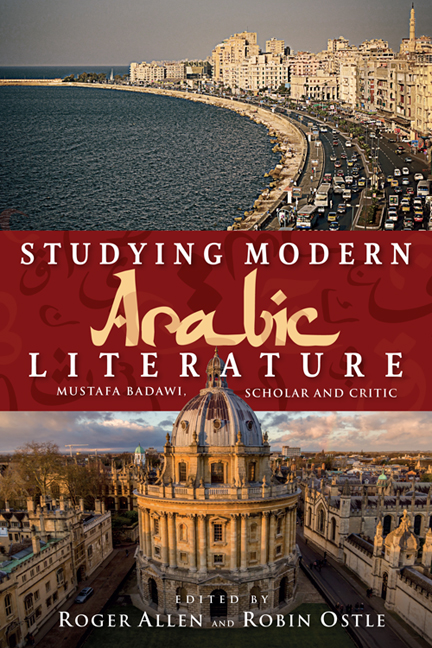Book contents
- Frontmatter
- Contents
- List of Figures
- Introduction
- Part I Alexandria to Oxford
- 1 The Cosmopolitan Alexandrian
- 2 Muhammad Mustafa Badawi in Conversation
- 3 Badawi: An Academic with a Vision. A Personal Testimony
- 4 From the Shadow Plays of Ibn Daniyal to the Poetry of Philip Larkin: Mustafa Badawi as Editor and Translator
- Part II The Academic Legacy
- Notes on the Contributors
- Index
1 - The Cosmopolitan Alexandrian
from Part I - Alexandria to Oxford
Published online by Cambridge University Press: 05 August 2016
- Frontmatter
- Contents
- List of Figures
- Introduction
- Part I Alexandria to Oxford
- 1 The Cosmopolitan Alexandrian
- 2 Muhammad Mustafa Badawi in Conversation
- 3 Badawi: An Academic with a Vision. A Personal Testimony
- 4 From the Shadow Plays of Ibn Daniyal to the Poetry of Philip Larkin: Mustafa Badawi as Editor and Translator
- Part II The Academic Legacy
- Notes on the Contributors
- Index
Summary
Mustafa Badawi was born in 1925 in Alexandria, the city in which he was to spend most of the first half of his life, initially as a school pupil in the 'Abbasiyya Secondary School and then as a member of the first cohort of students in the new University of Alexandria (then known as Faruq I University) which became an independent university in 1942 with Taha Husayn as its first Rector. After completing his doctorate in the University of London in 1954, Mustafa returned to his alma mater as a member of the Department of English, which he remained until his appointment in Oxford in 1964. During his youth and early manhood, Alexandria was still one of the great cosmopolitan port cities of the Mediterranean region, sharing many of the characteristics of its counterparts such as Beirut, Tunis and Algiers. But when the troops of Napoleon Bonaparte disembarked there in 1798, they found little more than a small crumbling seaside town of probably no more than some eight thousand inhabitants far removed from the magnificent city of the historical imagination. Yet, by the end of the nineteenth century, Alexandria was one of the most dramatic examples of that urban expansion which was characteristic of the Mediterranean port cities during this period: the number of its inhabitants has been estimated at 180,000 in 1865, and by the end of the century this figure had reached at least half a million.
The vibrant oil painting by the Alexandrian artist Muhammad Nagi (1888–1956) depicts the Mahmudiyya Canal (Fig.1.1). This was a vital feature of life in Alexandria during the youth and adolescence of Mustafa Badawi, and there are references to it in the fiction of his distinguished contemporary Edwar al-Kharrat. Today within the confines of the city the canal is almost impossible to see, unusued, overgrown and its waters mainly invisible. During the childhood of Badawi and al-Kharrat its banks were pleasant promenades; it teemed with the boats, the people and the produce which went to and fro between the western port and the Delta which lay to the south and east.
- Type
- Chapter
- Information
- Studying Modern Arabic LiteratureMustafa Badawi, Scholar and Critic, pp. 7 - 17Publisher: Edinburgh University PressPrint publication year: 2015



